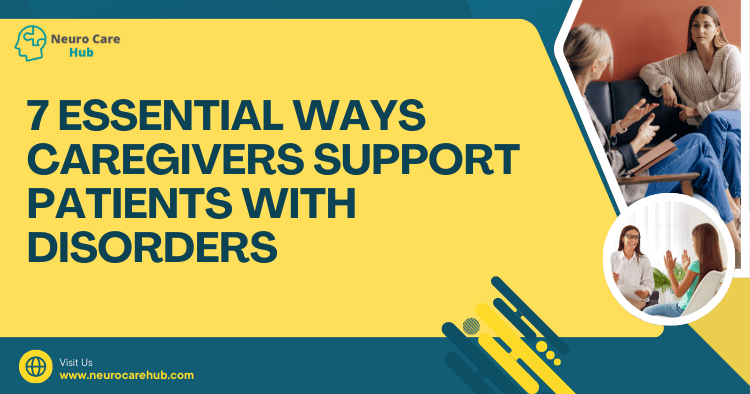Table of Contents
- Introduction
- 1. Emotional Support
- 2. Physical Assistance
- 3. Medication Management
- 4. Coordinating Healthcare
- 5. Advocacy
- 6. Education and Information
- 7. Social Interaction
- Conclusion
- FAQs
Introduction
Caregivers play a vital role in the lives of patients dealing with various disorders, whether chronic or acute. They provide essential support that not only aids in recovery but also enhances the quality of life for patients. In this article, we will explore seven essential ways caregivers assist patients, shedding light on the significance of their contributions.
1. Emotional Support
One of the most crucial roles of a caregiver is providing emotional support. Patients often face feelings of anxiety, depression, or isolation, especially when dealing with disorders. Caregivers can help by:
- Listening Actively: Sometimes, patients just need someone to listen. Active listening helps patients feel heard and validated.
- Encouraging Positivity: Caregivers can uplift spirits by encouraging a positive mindset. Simple phrases like “You’re doing great!” can make a world of difference.
- Offering Comfort: Physical acts of comfort, such as hugs or holding hands, can alleviate feelings of loneliness.
Research has shown that emotional support can significantly impact a patient’s recovery trajectory. According to the American Psychological Association, emotional support leads to better mental health outcomes.
2. Physical Assistance
Physical assistance is often necessary for patients with mobility issues or those recovering from surgery. Caregivers can assist patients by:
- Helping with Daily Activities: Tasks like bathing, dressing, or eating can be challenging for some patients. Caregivers can help ensure these activities are manageable.
- Mobility Support: Whether it’s helping with walking, using a wheelchair, or transferring from a bed to a chair, caregivers provide crucial physical assistance.
- Exercise and Rehabilitation: Encouraging patients to engage in light exercise or rehabilitation can aid recovery. Caregivers can remind and assist them in these activities.
A well-structured caregiving arrangement can enhance physical well-being. According to the Centers for Disease Control and Prevention (CDC), physical activity can reduce the risk of chronic diseases and improve mental health.
3. Medication Management
Proper medication management is critical for patients with ongoing health issues. Caregivers support patients by:
- Setting Reminders: Caregivers can help set up alarms or reminders for medication schedules, ensuring that patients do not miss doses.
- Monitoring Side Effects: Observing and reporting any side effects to healthcare providers is vital for adjusting treatments.
- Organizing Medications: Using pill organizers can help caregivers manage multiple medications, reducing the risk of confusion.
The National Institute of Health emphasizes the importance of medication adherence and how caregivers can facilitate this process.
4. Coordinating Healthcare
Navigating the healthcare system can be overwhelming for patients. Caregivers can ease this burden by:
- Scheduling Appointments: Caregivers can manage calendars and book appointments, ensuring patients receive timely care.
- Transporting Patients: Providing transportation to medical appointments is essential for those who cannot drive or use public transport.
- Communicating with Healthcare Providers: Caregivers can act as liaisons between patients and healthcare professionals, ensuring that vital information is shared.
Efficient coordination can lead to improved health outcomes. The World Health Organization outlines the importance of integrated care for better patient experiences.
5. Advocacy
Caregivers often act as advocates for their patients. This vital role includes:
- Understanding Patient Rights: Caregivers should be aware of the rights of patients and ensure they are respected in all healthcare settings.
- Facilitating Discussions: Caregivers can help patients articulate their needs and preferences during medical consultations.
- Seeking Resources: Finding community resources, support groups, or financial assistance can greatly alleviate the stresses associated with disorders.
The Patient Advocate Foundation emphasizes the importance of advocacy in healthcare for improved patient outcomes.
6. Education and Information
Knowledge is empowering, and caregivers can provide valuable education by:
- Explaining Conditions: Helping patients understand their disorders can be reassuring and foster better management.
- Promoting Healthy Lifestyle Choices: Caregivers can educate patients about diet, exercise, and mental health strategies that promote overall well-being.
- Providing Resources: Sharing brochures, websites, or books can help patients access more information about their conditions.
The National Institutes of Health (NIH) offers a wealth of information on various disorders, which caregivers can utilize to educate themselves and their patients.
7. Social Interaction
Isolation can be a significant challenge for patients, especially those with chronic conditions. Caregivers can help combat this by:
- Encouraging Social Activities: Inviting patients to social events or simple outings can improve mood and reduce feelings of loneliness.
- Facilitating Virtual Connections: In today’s digital age, caregivers can help patients connect with friends and family through video calls or social media.
- Being Present: Sometimes, just being there and engaging in conversation can lift a patient’s spirits.
The National Alliance on Mental Illness (NAMI) highlights the importance of social support in maintaining mental well-being.
Conclusion
The role of caregivers is multifaceted and profoundly impactful in supporting patients with disorders. From providing emotional and physical assistance to advocating for their needs, caregivers are indispensable allies in the journey of healing and recovery. By understanding and appreciating the essential ways caregivers support patients, we can foster a more compassionate and supportive healthcare environment.
FAQs
Q: What qualifications should a caregiver have?
A: While formal qualifications are not always necessary, caregivers should possess empathy, patience, and good communication skills. Specialized training may be beneficial for caregivers of patients with specific medical needs.
Q: How can family members become better caregivers?
A: Educating themselves about the patient’s condition, seeking support from healthcare professionals, and establishing a care plan can help family members become more effective caregivers.
Q: Are there support groups for caregivers?
A: Yes, many organizations offer support groups for caregivers. These groups provide a space for sharing experiences and gaining insights from others in similar situations. Check out resources like Caregiver Action Network.
Q: How can caregivers manage their own stress?
A: Caregivers should prioritize self-care by taking breaks, seeking support, and engaging in activities they enjoy to prevent burnout.
By understanding these essential roles, we can better appreciate the invaluable contributions of caregivers in the healthcare ecosystem.
Also Look For:
- Top 5 Ways Family Support Enhances Neuro Recovery
- Top 5 Ways Caregivers Enhance Neuro Care Effectiveness
- Top 5 Benefits of Support Groups for Neurological Patients
- Top 5 Challenges in Global Neuro Care Access Today
These resources further explore the essential roles caregivers play in supporting patients with neurological and other disorders.






